Resisting the Empire at Home & Abroad
Founding of Pastors for Peace and the Contra Attack
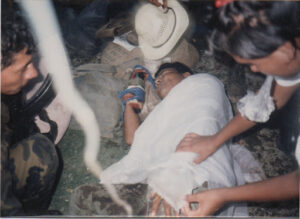 From the IFCONEWS Summer 1988 account of the US military-backed Contra militia forces attack against a Nicaraguan ferry boat carrying civilians, including the IFCO study delegation:
From the IFCONEWS Summer 1988 account of the US military-backed Contra militia forces attack against a Nicaraguan ferry boat carrying civilians, including the IFCO study delegation:
On August 2, 1988, “…Nicaraguan contras brutally attacked a civilian passenger boat killing two and wounding 29, including the Rev. Lucius Walker, Jr., tour leader and Executive Director of IFCO.”“…the group, which consisted of educators, pastors, students and a journalist, left the Atlantic coast town of Bluefields to begin a return trip to Managua…”
“Without warning and without provocation the shots rang out and people began to hit the decks. Bullets were flying all over, and heavy artillery was hitting the side of the boat so hard that the entire vessel shook.”
Rev. Lucius Walker prayed with the delegation and survivors and as he lay in the hospital recovering from his wounds, the idea of Pastors for Peace was born.
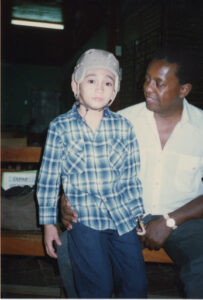 In a message from Rev. Walker, reprinted in IFCONEWS:
In a message from Rev. Walker, reprinted in IFCONEWS:
“…our personal life threatening experience and my injury should not be divorced from the daily threat to life which the Nicaraguan people suffer and the global political struggle of which they are a part.”
“Since 1970 IFCO has been in the forefront of the move to link ‘domestic’ and ‘international’ struggles because we understand that there is a direct connection between the domestic and international oppression of poor people.”
IFCO organized its first ever Pastors for Peace caravan to Nicaragua in December 1988 to build solidarity between communities in the US and Nicaragua and to sound a call to end the US government and corporate strategy of war against the people of Central America.
First Pastors for Peace Caravan
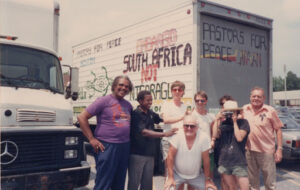 With festive, colorful buses, cars and trucks that read “Embargo South Africa Not Nicaragua” (in reference to the apartheid regime) “Builders of Peace” and “Pastors for Peace,” IFCO’s first ever Pastors for Peace caravan hit the road. On Christmas Eve 1988, the caravan rolled into Managua with 70 tons of humanitarian aid and 20 vehicles from across the US to demonstrate their solidarity in the face of US-sponsored Contra war.
With festive, colorful buses, cars and trucks that read “Embargo South Africa Not Nicaragua” (in reference to the apartheid regime) “Builders of Peace” and “Pastors for Peace,” IFCO’s first ever Pastors for Peace caravan hit the road. On Christmas Eve 1988, the caravan rolled into Managua with 70 tons of humanitarian aid and 20 vehicles from across the US to demonstrate their solidarity in the face of US-sponsored Contra war.
Once they arrived on the Atlantic coast from Managua, caravanistas met with boat-builders, fishers and other members of the community and witnessed first hand the devastating effects of both Contra warfare and Hurricane Joan. Despite the destruction, there was a sense of hope of the community because the Sandinista government had already sent supplies to the region and community health efforts had helped ward off rampant bacterial infection in the wake of the hurricane.
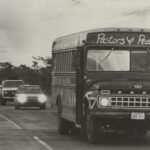
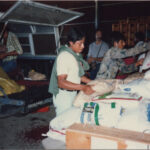
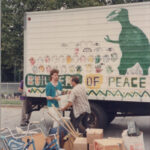
1992 Pastors for Peace Organizes First Caravan to Cuba
The fall of the Soviet Union had a crushing impact on Cuba—Cubans lost some of the buffering that protected them from the harsh impact of the U.S. embargo. Rev. Lucius Walker led a fact-finding delegation to Cuba and met with various Cuban church leaders to plan solidarity efforts. The Pastors for Peace model quickly came to mind, and the U.S. / Cuba Friendshipment caravan was organized. Through direct people-to-people sharing through religious communities, supplies would be brought to Cuba in violation of the embargo. The purpose was two-fold: To provide substantive assistance; but also to highlight the suffering caused by the embargo. “We refuse to be complicit with a policy of death and starvation,” Walker said. ‘We need to stop putting a pretty face on this brutal blockade—to admit that Cuban children are being denied access to lifesaving medicines because of our government’s policies, and to stop punishing those innocent children.”
In November 1992, 100 volunteers brought 15 tons of supplies—powdered milk, medicines, Bibles, bicycles and school materials—to the U.S.-Mexico border for shipment to Cuba. U.S. officials blocked their way, and CNN caught border agents assaulting a Catholic priest carrying Bibles for Cuba. The quick public response to these heavy-handed government actions prompted officials to allow the caravan to cross the border. But that was not the last confrontation.
Rev. Walker really wanted to challenge the blockade, so the group decided not to apply for an export license. Walker argued that such a license allowed the U.S. government too much control, in effect acknowledging the blockade. “We choose instead to respond to a higher authority,” Walker said. “What the U.S. government calls ‘trading with the enemy,’ we regard
as taking a cup of cold water to a neighbor in need.”
